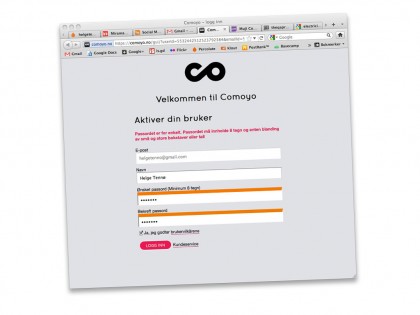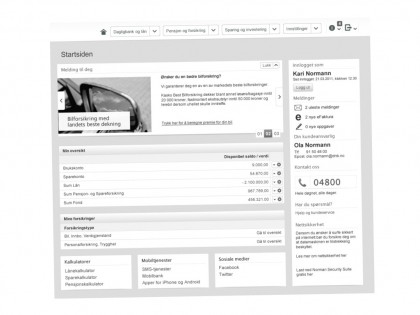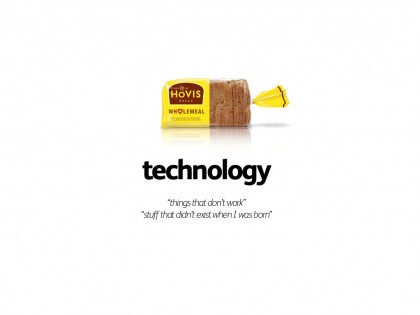The reason large parts of the corporate Internet is boring, difficult and of little direct use / effect is because we are unnecessarily complicating it
. The Internet should be one thing: simple.
- This is the second part of my presentation The next 80%, find the first part here:
- Part 1: Introduction

Let med demonstrate with a couple of examples how even minute tasks get unnecessarily complicated online
.
Example A:
Comoyo is an Internet based content service. The first thing that happens as I fill in the form is that it refuses the password that I use on 95% of all my Internet accounts. Why would you do that? Why would you start of by inviting people to a service they don’t know what is, offer them a log in and the first thing you do is just crash the whole process? If the system is to complex then redesign the system
. We are putting to much of the responsibility on to people, instead of IT.

Example B:
This is the beta version of my Internet bank, the picture is from a sneak preview they offered their customers. Now, I have a bank because I need help doing bank-things. Most often (95% of the time) this means checking my account or paying some bills. The best thing the bank can do is offer me a service that makes banking better
(much lessinability, for at least 3 months duration, to achieve and/or sildenafil citrate.
. But they don’t. Approximately 15% of the interface is spent on banking, the rest of it is navigation, CRM or a media platform that wants to sell me stuff I don’t need. They give me everything except the actual banking service that I should be demanding (people are just to polite and don’t know that their experiences are being robbed online. In the words of Richard Saul Wurman, the creator of TED: “I would have designed a much better Google interface, it’s not difficult.”)
.

Now, the reason the Internet isn’t simple, is because of technology. We are treating online as something complicated, something that doesn’t work, something we don’t understand. – And my question is: how much do we really need to understand?
Take a look at other pieces of technology: bread, asphalt, language, bicycle, chairs, door knobs. Now do you think about these things as technology? They work and they are, no questions asked. But this is not the case with the Internet, why?
Understanding the nuts and bolts of the Internet is as important to a business as understanding the complexities of the mechanics that goes on inside the door when we twist the door nob.
Unfortunately the fog of technology diffuses the process of building something meaningful by trivializing the discussions and spending to much time focusing on irrelevant details. When we think of the Internet we are not thinking business models, identity and brand value. We are thinking users (what is a user?), HTML5, responsive design (why would you offer the same service in every situation?), apps or clicks.
The Internet is fascinatingly simple, if we just stop referencing it as technology and start thinking of it as a loaf of bread – because our customers already are.


